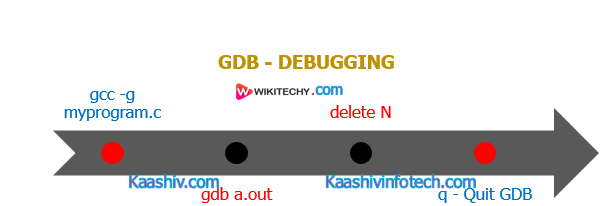GDB Debugging Programs
GDB Debugging Programs

Gdb Debugging
gcc -g myprogram.c- Compiles myprogram.c with the debugging option (-g). You still get an a.out, but it contains debugging information that lets you use variables and function names inside GDB, rather than raw memory locations (not fun).
-
gdb a.out- Opens GDB with file a.out, but does not run the program. You’ll see a prompt (gdb) - all examples are from this prompt.
- r
- r arg1 arg2
- r < file1
- Three ways to run “a.out”, loaded previously. You can run it directly (r), pass arguments (r arg1 arg2), or feed in a file. You will usually set breakpoints before running.
- help
- h breakpoints
- Lists help topics (help) or gets help on a specific topic (h breakpoints).
- q - Quit GDB
Stepping through Code
- Stepping lets you trace the path of your program, and zero in on the code that is crashing or returning invalid input.
- l
- l 50
- l my function
- Lists 10 lines of source code for current line (l), a specific line (l 50), or for a function (l myfunction).
- next
- Runs the program until next line, then pauses. If the current line is a function, it executes the entire function, then pauses. next is good for walking through your code quickly.
- step
- Runs the next instruction, not line. If the current instruction is setting a variable, it is the same as next. If it’s a function, it will jump into the function, execute the first statement, then pause. step is good for diving into the details of your code.
- finish
- Finishes executing the current function, then pause (also called step out). Useful if you accidentally stepped into a function.
Breakpoints or Watchpoints
- Breakpoints play an important role in debugging. They pause (break) a program when it reaches a certain point. You can examine and change variables and resume execution. This is helpful when some input failure occurs, or inputs are to be tested.
- break 45
- break myfunction
- Sets a breakpoint at line 45, or at myfunction. The program will pause when it reaches the breakpoint.
- watch x == 3
- Sets a watchpoint, which pauses the program when a condition changes (when x == 3 changes). Watchpoints are great for certain inputs (myPtr != NULL) without having to break on every function call.
- continue
- Resumes execution after being paused by a breakpoint/watchpoint. The program will continue until it hits the next breakpoint/watchpoint.
- delete N
- Deletes breakpoint N (breakpoints are numbered when created).
